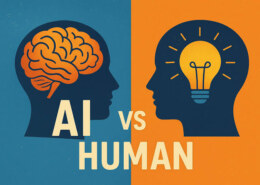In an era where algorithms can generate poetry, paint pictures, and compose symphonies, it’s no surprise that artificial intelligence has also stepped into the world of scriptwriting. Tools like ChatGPT, Sudowrite, and Jasper are being used to churn out screenplays, commercials, and even entire film scripts in a matter of minutes. But while AI may be fast and data-rich, can it truly rival the emotional depth and creative spontaneity of a human writer?
Let’s unpack the evolving landscape of scriptwriting and explore who’s really winning—AI or human creativity.
The Rise of AI in Scriptwriting
AI-powered writing tools are becoming increasingly common in Hollywood and beyond. These systems are trained on vast corpora of scripts, novels, and dialogues. They can replicate genre-specific tropes, mimic a writer’s style, and even adapt a storyline based on user prompts.
For production companies on tight budgets or deadlines, AI offers a tempting proposition:
-
Speed: AI can generate a 90-page script in less than an hour.
-
Cost-efficiency: It eliminates the need for multiple drafts and expensive script consultants.
-
Data-Driven Storytelling: AI can analyze what works—popular tropes, structures, character arcs—and incorporate them into new stories.
Projects like Sunspring (a short sci-fi film written entirely by AI) and AI-assisted ad campaigns have already made waves in the industry. But while these demonstrate the technical prowess of AI, they also highlight its limitations.
What AI Still Can’t Do (Well)
Despite its strengths, AI still struggles in key areas where human writers excel:
-
Emotional Nuance: AI can replicate patterns in dialogue, but it often lacks genuine emotional resonance. It struggles to write from lived experience, tapping into the raw human condition.
-
Originality: AI writes by remixing existing content. It’s derivative by design, not inventive. That means it can fall back on clichés, tropes, or stale storytelling.
-
Cultural Sensitivity and Subtlety: Humans understand context, cultural nuances, and the social undercurrents that make a story feel timely and relevant. AI lacks that lived insight.
-
Improvisation and Intuition: Writers often go with a “gut feeling” that breaks the rules but works. AI, trained on patterns, is more rigid and formulaic.
Collaboration: The Middle Ground
Rather than pitting AI and humans against each other, many creatives are finding a middle ground. AI becomes a tool—a creative partner rather than a replacement.
Writers use AI to:
-
Brainstorm plot points
-
Generate alternate dialogue options
-
Overcome writer’s block
-
Quickly prototype script ideas
This hybrid model of “human + machine” often yields the best results. The writer maintains control, shaping the AI’s suggestions into something with emotional weight, narrative tension, and originality.
The Human Edge
Scriptwriting is more than assembling words into a structure—it’s about perspective. It’s about telling stories that reflect identity, experience, and emotion. Great scripts don’t just follow a beat sheet—they reveal something new, challenge the audience, or make them feel seen.
That human touch is irreplaceable. Whether it’s Greta Gerwig’s layered storytelling in Barbie, or Bong Joon-ho’s genre-bending brilliance in Parasite, these works thrive not because they follow structure, but because they break it with purpose. That’s something no AI has managed yet.
So, Who’s Winning the Scriptwriting War?
It’s not really a war—it’s a shift.
AI is becoming a powerful creative aid, capable of accelerating and supporting the writing process. But it’s not replacing human storytellers anytime soon. At least, not the good ones. The best scripts still come from a place of humanity—empathy, insight, and lived truth.
In the end, the most compelling stories will likely be born not from choosing AI over humans, but from how well we combine the two. The future of scriptwriting may not be man versus machine, but man with machine.

